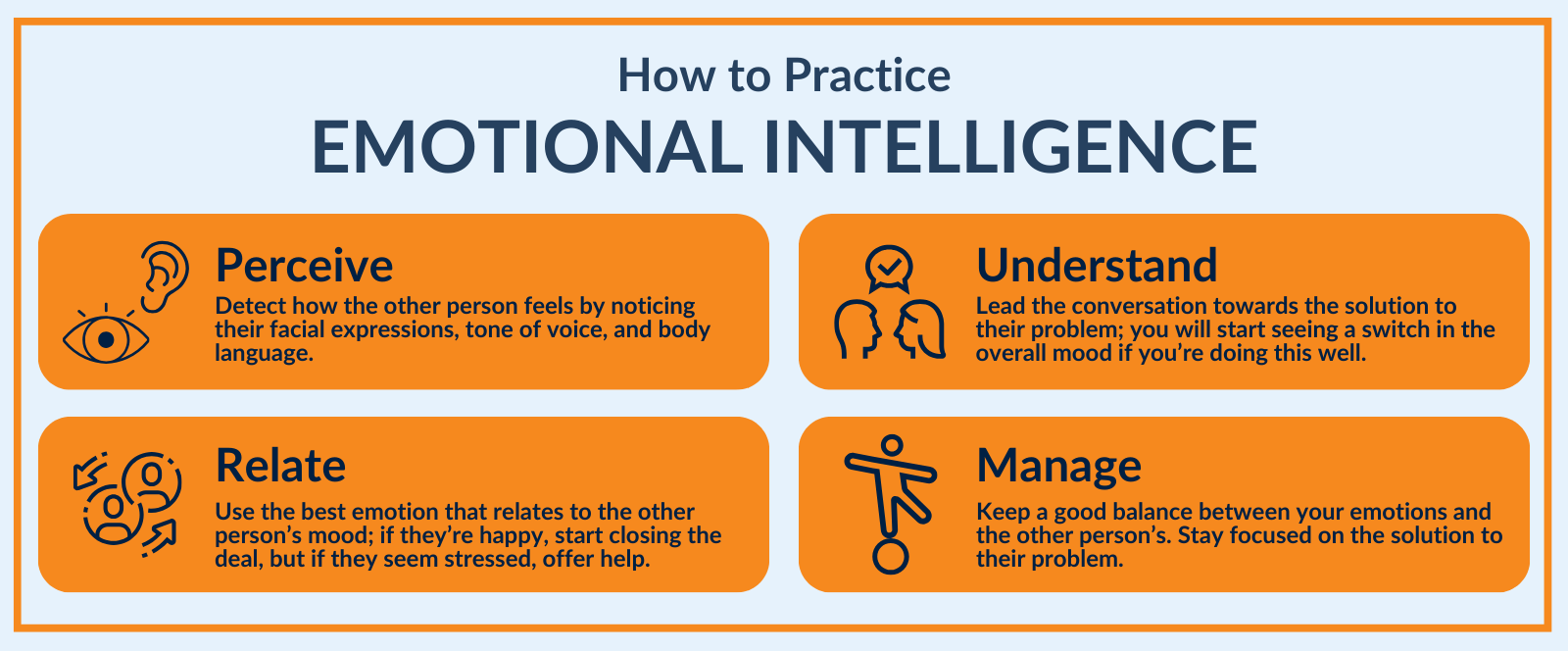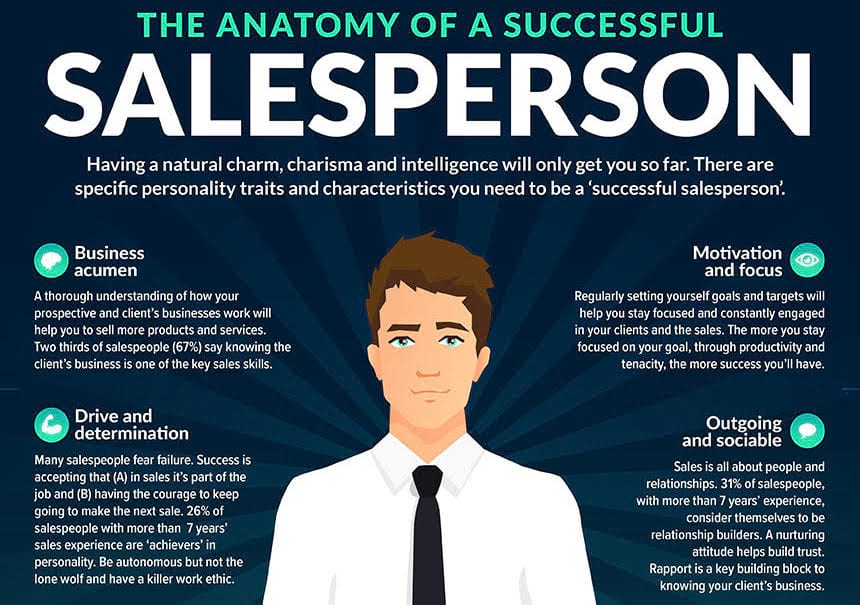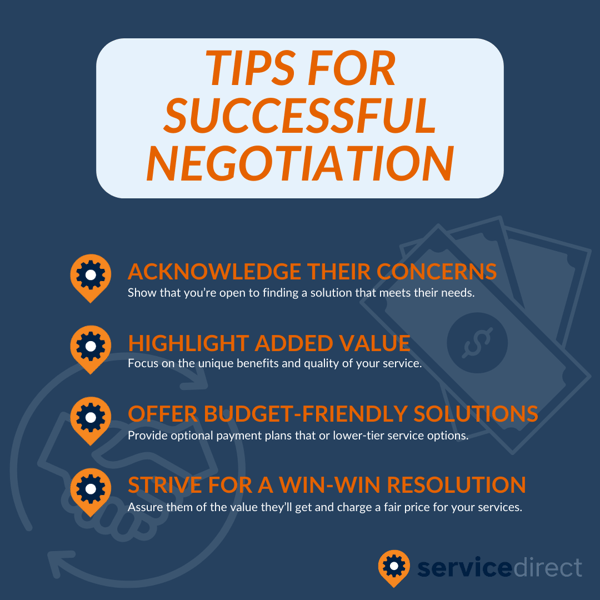11 Important Sales Skills for Your Entire Team
Charisma often proves to be the secret weapon of a good salesperson, as they effortlessly win over even the most skeptical hearts and minds. However, the era of trustworthy door-to-door salespeople is long gone, and charisma alone won't get you very far in today’s field.
In the exciting world of sales, success comes to those who can consistently beat their goals, build strong relationships with customers, and use their communication, adaptability, and product knowledge skills in an artful way.
The successful salesperson has a good sense of what the customer wants and is skilled at negotiating. They manage time well, are always eager to learn, and give off an aura of confidence and positivity that simply seals the deal.
But this is just one small piece of the pie. Apart from locating crucial salesperson skills in your employees (both current and potential), you need to be able to hone those skills and know exactly what you’re looking for in your next deal closer.
Top Salesperson Skills Everyone On Your Team Should Cultivate
Not everyone can be Harvey Specter from Suits, but there is a certain formula for success in the sales business. It may not be as simple as “sugar, spice, and everything nice” but it contains a set of 11 ingredients that make an impeccable foundation for closing deals.
People Skills
First things first: great salespeople know how to act around other people. Some of them are born talents, but it’s possible to learn to decode customer psychology, put your best self forward, and know exactly what to say and when to say it to seal the deal.
While great salespeople know how to act around other people, this skill is essential for anyone in a small business. Whether you're answering calls, managing a team, or handling suppliers, understanding how to interact with different personalities is crucial. Small businesses often have fewer layers between employees and customers, making interpersonal skills vital for everyone.
Emotional Intelligence
Emotional intelligence lets you empathize with other people’s feelings and enables you to manage your own emotions in such a way that others can relate to you and follow your guidance. This is one of the most valuable salesperson skills, and you can put it to use in four simple steps:

Remember: An emotionally intelligent person knows how to control their feelings, both positive and negative, in order to achieve their goals.
In small businesses, employees often interact with customers directly, making it essential to empathize and manage emotions effectively. For example, a project manager in a small tech firm notices a team member looking stressed. Using emotional intelligence, they approach the individual, offering a listening ear and adjusting project timelines to alleviate pressure.
Networking
We already talked about how customer referrals are king and why word-of-mouth marketing should be part of your marketing strategy. And just like with marketing, word-of-mouth wisdom is what makes you a better salesperson as well.
That is why networking with your peers and mentors is so important. It gives you a supportive environment that helps you figure out how to deal with complicated sales processes, making your sales efforts more successful.
Networking isn't just for salespeople. In a small business, connections can lead to partnerships, collaborations, and new opportunities.
For example, an accountant at a small business attends a local seminar and connects with a tax expert. This connection later helps the company save on taxes through new deductions they hadn't previously considered.
Effective Communication
From making or taking phone calls and hopping on live chats all the way to email copywriting, you’re expected to be a true communication chameleon. But this kind of chameleon doesn’t blend into the background once there’s a problem.
In fact, effective communication implies different aspects, including:
- Clarity
- Empathy
- Openness
- Respect and Courtesy
- Adaptability
- Timeliness
In a nutshell, being effective in how you communicate allows you to get your points across and achieve your objectives.
Clear and empathetic communication is vital in any role. For small businesses, where roles are often multifaceted, being able to convey ideas, provide updates, and share feedback effectively can make operations run smoothly.
Active Listening
If you want to become an expert in customer support, you need to know how to listen. Pressuring someone to buy from you will just turn the person away, and you can avoid that by simply hearing their thoughts out.
Many times, all you have to do is find out what they need and where you can help. Asking questions to help steer the conversation in a direction that yields the information you seek is highly effective, but you should be careful not to dominate it. Play with your lead, not against them.
This skill is essential for everyone, from customer support to management. In a small business environment, understanding client needs, employee feedback, or supplier terms requires active listening.
Confidence
Confidence may seem like one of the most obvious salesperson skills, as confident people evoke confidence in others. Even if your lead is still on the fence about their decision, it’s your assurance that will help them make the best decision for themselves.
And you know what they say: If you’re not feeling confident enough, fake it ‘til you make it. At the end of the day, that kind of bravery will surely boost your confidence levels!
While confidence can help close a sale, it's also essential for presenting ideas, leading a team, or even negotiating with suppliers.

Image Source: salestrong.co.uk
Business & Marketing Intuition
Intuition isn’t something that’s easily learned – a very lucky few are simply born with it, but most of us must learn how to develop it over time. This starts with learning how to distinguish between red and green flags. Luckily, we already know what kind of salesperson skills you need to master in order to trust your gut more.
Every employee in a small business can benefit from understanding the market and having a sense of business intuition. A content writer at a small e-commerce company could suggest a blog topic based on a hunch about upcoming summer trends. As a result, the blog post drives significant traffic and sales.
Client Prospecting
Salespeople have to figure out how to prospect for new clients. Good client prospecting is a treasure hunt where salespeople find good leads and turn them into loyal customers.
Once you figure out prospects' likes, dislikes, and pain points, you must ensure your products and services meet these needs. Want to increase your lead potential? Add cold emails, cold calls, social media, and networking events to your repertoire.
After you've successfully prospected a few customers, it's time to establish rapport with them. Knowing their interests and needs and connecting with them on a personal level will increase the likelihood of a successful sale.
While this is a core sales skill, understanding client needs and preferences can benefit roles like product development, marketing, and even finance in a small business. One example of that would be the operations manager of a small event planning company that identifies potential clients by attending local business openings and offering their services for future events.
Negotiation and Foresight
There will be situations where you write a job estimate but your client doesn’t feel comfortable with the price. Instead of offering too steep of a discount, take a breath and follow the proven formula:
- Acknowledge their concerns and show that you're open to finding a solution that meets their needs.
- Highlight added value and focus on the unique benefits and quality of your service.
- Offer budget-friendly solutions or payment plans that preserve job essentials.
- Strive for a win-win resolution by assuring them of the value they'll get and charging a fair price for your services.

When observing the bigger picture, negotiation skills are not useful in sales only. Whether you're discussing terms with a supplier, setting project timelines, or deciding on job roles, negotiation skills are invaluable.
Ambition
Salespeople who want to do well are always determined to do so, pushing through problems and setbacks to reach new heights. Their drive to succeed keeps them going when they are prospecting, talking to customers, and closing deals, which makes them stand out as top performers.
With ambition as their guide, salespeople are always looking for ways to get better. They never settle for mediocrity and always try to do better than their competitors.
Storytelling
Have you ever surfed the web trying to find a good pair of running sneakers but ended up with a cart full of other equipment? No need to feel guilty about that, as we’re all prone to fall for good storytelling, especially when we’re empowered to regain physical health and prepare for summer at the beach.
A good story revolves around a solid presentation, knowledge about your product, its capabilities, keeping your client in mind at all times, and using a lot of creativity. Incorporating AI tools for professional presentations can further enhance storytelling by helping you create visually appealing and compelling presentations that captivate your audience.
Once again, it is a useful skill beyond sales. Whether you're explaining a product to a customer, presenting a business plan, or sharing the company's mission with new employees, storytelling can make your message memorable and impactful.
Public Speaking & Presentation
Nothing's worse than freezing up in the middle of a presentation in front of a group of people, or even a single prospect. Not all of us love to speak to a large audience, but you wouldn’t believe the amount of time great speakers spend practicing their presentations in front of a mirror or with their loved ones.
In case you’re feeling uncomfortable speaking without an accompanying presentation, feel free to use simple tricks to make your presentation more interactive. It will keep your audience engaged and help you narrate your story in the best way possible.
In a small business, employees often have opportunities to represent the company, whether it's at a local event, a trade show, or a community gathering. For example, a sustainability officer at a small company presents their green initiatives at a local community event, earning the company recognition and support from eco-conscious customers.
Product and services knowledge
Since you can't predict exactly what questions customers will ask, it's in your best interest to learn as much as you can about the products and services, from its strengths to its weaknesses.
This can help you make an impressive presentation to clients and customers, which should ultimately result in a sale. Customers and clients will have more faith in you if you demonstrate that you have a firm grasp of the product and its many applications.
Understanding the company’s offerings isn't just for sales. In a small business, every employee might find themselves answering questions about their products and services, making suggestions for improvements, or even using the product themselves. Plus, a diversity of backgrounds and approaches to your products and services can help your product team identify potential issues and take advantage of opportunities they might not have otherwise thought of.
Creativity
Your ability to be creative is directly connected to your success in closing deals. A salesperson who uses an original and interactive multimedia presentation that includes videos, animations, and personalized content is more likely to sell than a boring show-off that's all words and no results.
Once you immerse the prospect in a digital experience designed to demonstrate how your product or service solves problems in novel ways, you’ll pique their interest.
In a small business setting, resources might be limited. Creativity can lead to innovative solutions, whether it's in marketing, product development, or problem-solving.
Tips for HOning Employee Skills
Okay, we went over the most important salesperson skills, but how can you hone your team’s abilities as an employer? Should you let them explore the waters by themselves, or should you be the captain and steer the ship yourself? Neither is great, but you can help them become an effective crew that fears no tide.
Set Attainable Goals
Encouraging workers to acquire fresh skills hinges on providing them with specific, achievable goals. Having a purpose and working toward it gives your team a sense of satisfaction.
To increase the number of deals closed or to exceed quarterly sales goals, a sales team may choose to work on their negotiating skills. Frequent progress reviews and praise for their efforts boost their motivation to improve and enhance the quality of their work.
Encourage Work-Life Balance
Higher levels of creativity and productivity in the workplace have been linked to the ability of employees to devote time to activities outside of work. Some businesses may grant employees leeway in scheduling or actively promote personal development beyond work hours.
When a company invests in its employees by funding workshops, language classes, and fitness activities, it demonstrates care for their overall well-being and encourages the development of transferable skills.
Plan Team Activities
Workshops and other forms of employee collaboration actively promote knowledge sharing and the distribution of new ideas, encouraging the exploration of fresh perspectives.
Team building exercises that test communication, introduce the team to self-reflection in the workplace, and improve problem-solving abilities foster a sense of camaraderie and motivate employees to develop necessary soft skills.
For instance, a marketing team can draw on each member's unique strengths and work together to develop a successful advertising campaign with a small budget, leveraging their diverse skill sets for a collective accomplishment.
The Importance of Continuous Development
Professional growth is the foundation of a thriving and productive workplace. Establishing a culture of learning raises morale and productivity by giving your team autonomy over their own professional growth.
Adopting a mindset of continuous improvement leads to a more productive and adaptable team that can keep up with the rapidly evolving business landscape. This commitment to learning ensures that the team as a whole will succeed in the dynamic business climate of the present and future.
Conclusion
Successful salespeople have well-honed skills, a magnetic personality, and a strong desire to learn and improve. Investing in the right people and encouraging their growth allows you to foster an outstanding sales force that can successfully engage customers, close deals, and adapt to a dynamic market.
Finding, hiring, and developing the right salespeople—the real builders of successful businesses and long-lasting client relationships—is the key to achieving sales success.
But remember, in order to maximize your sales force’s skills, you will need great leads. Our Service Direct lead generation programs deliver the exact type of customer your business needs. For local service businesses, this type of targeting isn’t a luxury; it’s a necessity. So get your leads and experience real growth now!

Alex Birkett co-founded Omniscient Digital, a premium content marketing & SEO agency. He lives with his dog Biscuit in Austin, Texas, and writes at alexbirkett.com.



